
Introduction
Quantum computing, a cutting-edge frontier in the world of technology, has gained significant attention for its potential to revolutionize computation. As we venture further into the 21st century, the quest to harness the power of quantum bits (qubits) has intensified, leading to increasing powerful quantum computers.
Ranking the ten best quantum computers in the world is a formidable task, considering the dynamic nature of this field and the multifaceted criteria involved. This article will explore these remarkable machines, considering processing power, error rates, and their impact on scientific research and practical applications.
Ten Best Quantum Computers in the World
Here are the best quantum computers currently under process or are working in the world:
1. USTC Jiuzhang

- Qubit Size: USTC Jiuzhang, a remarkable quantum computer developed by the University of Science and Technology of China (USTC), boasts an impressive assembly of 100 photon qubits.
- Innovative Photon-Based Technology: It employs photons and light particles as its qubits. This innovative approach allows USTC Jiuzhang to harness the unique properties of photons, making it one of the most powerful quantum computers in the world.
- Unmatched Quantum Volume: With a staggering quantum volume 10 billion, USTC Jiuzhang reigns as the pinnacle of quantum computing prowess. Quantum volume is a crucial metric, indicating its capability to solve complex problems and process vast amounts of data.
- Connectivity and Scalability: Using photons as qubits enables seamless connectivity between them, enhancing the machine’s ability to perform complex calculations. This connectivity feature sets it apart from other quantum computers.
- Leaders in Quantum Supremacy: USTC Jiuzhang has made significant strides in the quest for quantum supremacy, marking a major milestone in quantum computing development.
- Scientific and Practical Applications: Beyond its raw power, this quantum computer holds immense promise for scientific research, cryptography, optimization, and simulating quantum systems, paving the way for breakthroughs in various domains.
- Release date: 3rd December 2020
USTC Jiuzhang, with its photon-based qubits and astounding quantum volume, serves as a testament to the rapid evolution and growing capabilities of quantum computing. It pushes the boundaries of what is possible in computation and provides a platform for groundbreaking advancements in science and technology.
2. Xanadu Borealis
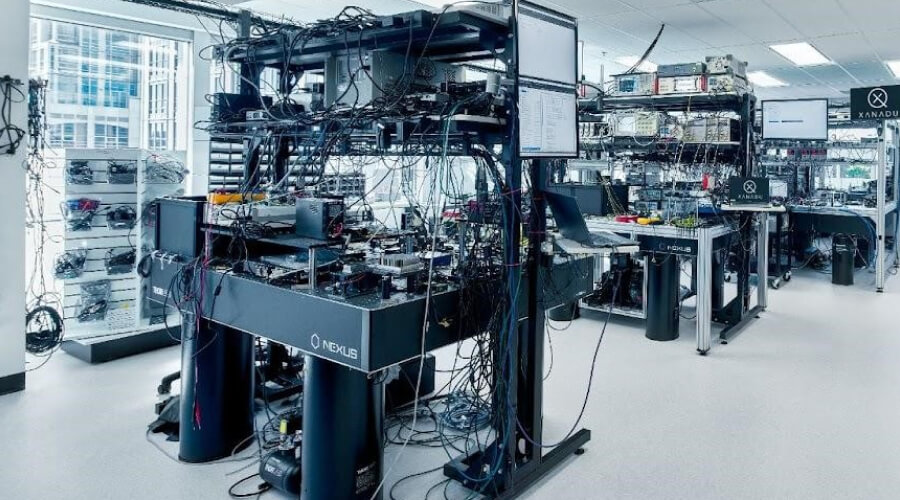
- Qubit Size: Xanadu Borealis, a pioneering quantum computer developed by Xanadu, boasts an impressive array of 128 qubits, showcasing the company’s commitment to pushing the boundaries of quantum computing.
- Leading in Photonic Quantum Computing: This quantum marvel is recognized as the most powerful photonic quantum computer, utilizing photons as qubits. This choice of qubits aligns with Xanadu’s vision of harnessing the potential of light particles for quantum computation.
- Quantum Volume Excellence: Xanadu Borealis joins the ranks of the world’s most potent quantum computers with a quantum volume of 10 billion, a testament to its computational prowess.
- Qubit Stability Challenge: While it boasts more qubits than USTC Jiuzhang, Xanadu Borealis faces the challenge of qubit stability. This is why it shares the same quantum volume as USTC Jiuzhang. The ability to maintain stable qubits is a crucial aspect of quantum computing.
- Innovation and Scalability: Xanadu Borealis reflects Xanadu’s commitment to innovation and scalability in quantum technology. It is a platform for exploring new frontiers in quantum research and applications.
- Versatile Applications: This photonic quantum computer holds the potential to transform a wide range of fields, from optimization problems and quantum simulation to cryptography and materials science.
- Release date: 2nd June 2022
With its impressive qubit count and emphasis on photonic quantum computing, Xanadu Borealis represents a significant leap forward in the quantum computing landscape. While facing qubit stability challenges, its quantum volume and potential applications make it a key player in the evolving world of quantum technology.
Check Out: 5 Best Quantum Threat Intelligence Platforms
3. IonQ Quantum Computer
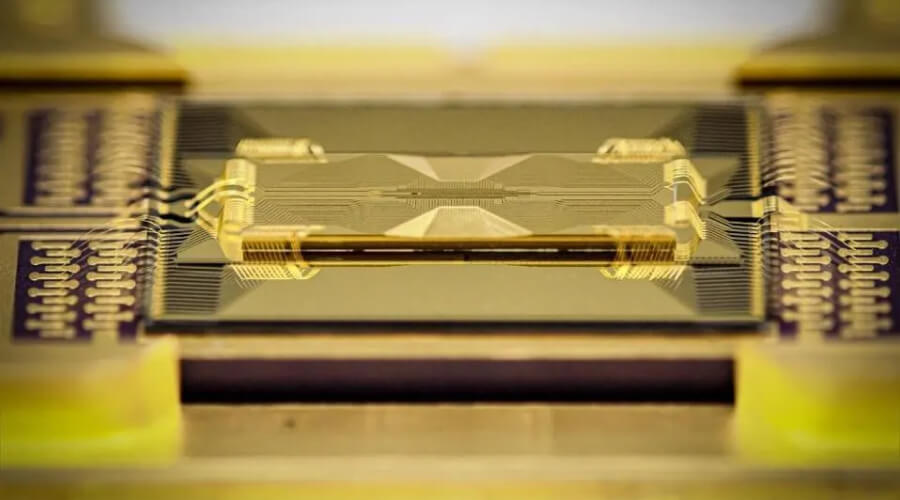
- Qubit Size: IonQ Quantum Computer, a formidable creation by IonQ, boasts an impressive ensemble of 128 qubits, showcasing the company’s dedication to advancing quantum computing technology.
- Commercial Quantum Superiority: Positioned as the most potent commercial quantum computer, IonQ Quantum Computer represents a critical milestone in integrating quantum technology into practical, real-world applications.
- Trapped Ions for Stability: It distinguishes itself by employing trapped ions as qubits, prioritizing stability and precision in quantum calculations. Trapped ions are known for their exceptional coherence and accuracy.
- Significant Quantum Volume: With a substantial quantum volume of 4.8 billion, IonQ Quantum Computer demonstrates its computational capabilities, opening doors to solving complex problems and processing substantial data sets.
- Commercial Accessibility: IonQ’s commercial focus ensures that businesses and researchers can access this powerful quantum machine, potentially transforming industries with previously insurmountable computational challenges.
- Real-World Applications: This quantum computer’s accuracy and stability make it well-suited for various practical applications, including optimization problems, cryptography, drug discovery, and materials science.
- Release Date: 27th September 2023
IonQ Quantum Computer, with its emphasis on trapped ions and real-world usability, stands as a leading example of how quantum computing can move beyond research and into the commercial realm, offering the potential to revolutionize various industries with its unprecedented computational capabilities.
4. Rigetti Advantage
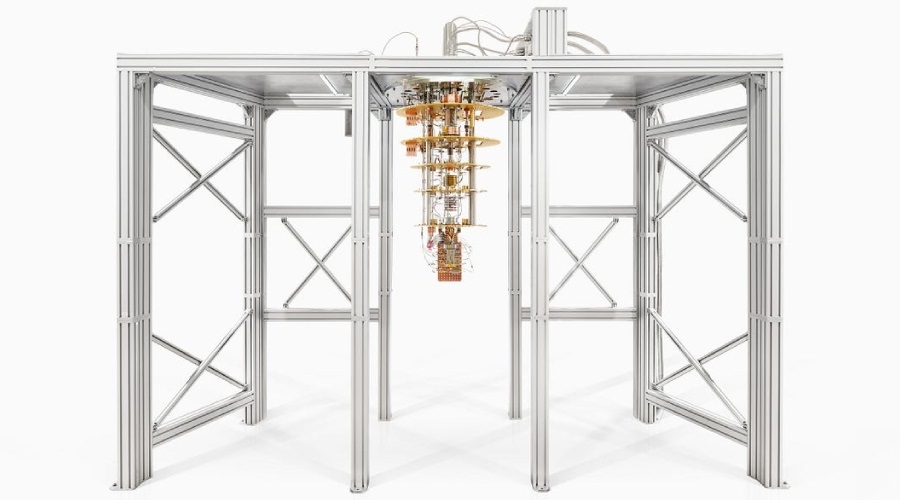
- Qubit Size: Rigetti Advantage, an exceptional quantum computer crafted by Rigetti Computing, showcases a robust assembly of 128 qubits. This substantial qubit count underlines Rigetti’s commitment to advancing quantum computing technology.
- Superconducting Prowess: A defining feature of Rigetti Advantage is its utilization of superconducting qubits. These qubits are recognized for their stability, an attribute that enhances the reliability and accuracy of quantum calculations.
- Quantum Volume Triumph: Rigetti Advantage shines with a commendable quantum volume of 1.6 billion, a testament to its computational capabilities and the company’s relentless pursuit of quantum excellence.
- Connectivity Challenges: While superconducting qubits offer stability, they pose challenges in creating larger quantum computers due to connectivity limitations. This aspect underscores the delicate balance in choosing qubit types for quantum machines.
- Research and Practical Applications: Rigetti Advantage is poised to impact both the research and commercial sectors. Its stability and accuracy make it suitable for various applications, including optimization, cryptography, drug discovery, and materials science.
- Release date: 10th February 2023
Rigetti Advantage, focusing on superconducting qubits, brings a new dimension to quantum computing, combining stability with remarkable computational power. It is a testament to Rigetti Computing’s dedication to pushing the boundaries of quantum technology, unlocking new possibilities in various fields.
5. Intel Horse Ridge II
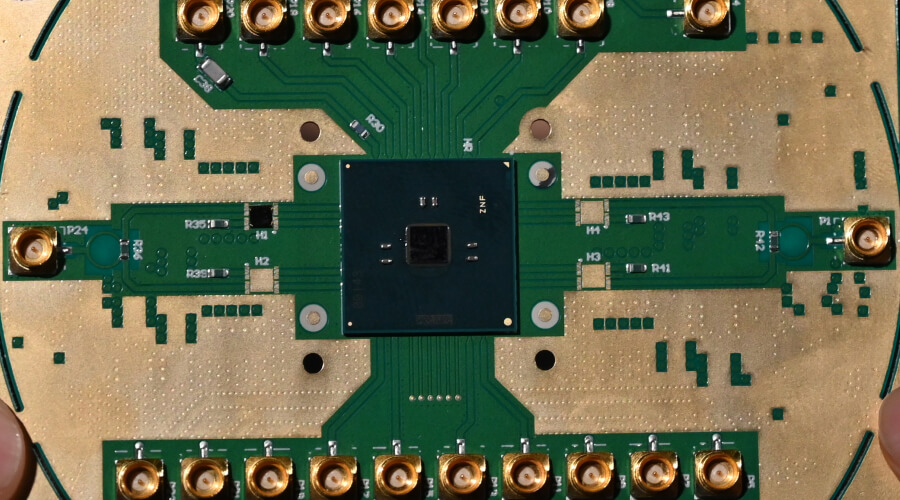
- Qubit Diversity: Intel Horse Ridge II, a pioneering quantum computer developed by Intel, stands out with its versatile qubit configuration. It possesses many remarkable 400 million spin qubits or can harness the power of 8 superconducting qubits.
- Spin Qubit Dominance: One of the most distinctive features of this quantum computer is its dominance in the realm of spin qubits, surpassing all others in this category. Although weaker in some aspects, spin qubits bring unique advantages.
- Diverse Capabilities: The flexibility to switch between spin qubits and superconducting qubits offers a range of computational possibilities, making it a versatile platform for various quantum applications.
- Quantum Landscape Exploration: Intel Horse Ridge II represents Intel’s commitment to pushing the boundaries of quantum computing and exploring unconventional qubit technologies.
- Challenges and Opportunities: While spin qubits may be weaker in some aspects, their unique properties open doors to novel quantum research and potential applications in specific domains.
- Release date: December 2020
Intel Horse Ridge II, with its distinctive qubit composition, exemplifies Intel’s innovative approach to quantum computing. While presenting challenges, its exploration of spin qubits also offers exciting opportunities for advancing the field and discovering new use cases for quantum technology.
6. D-Wave Advantage
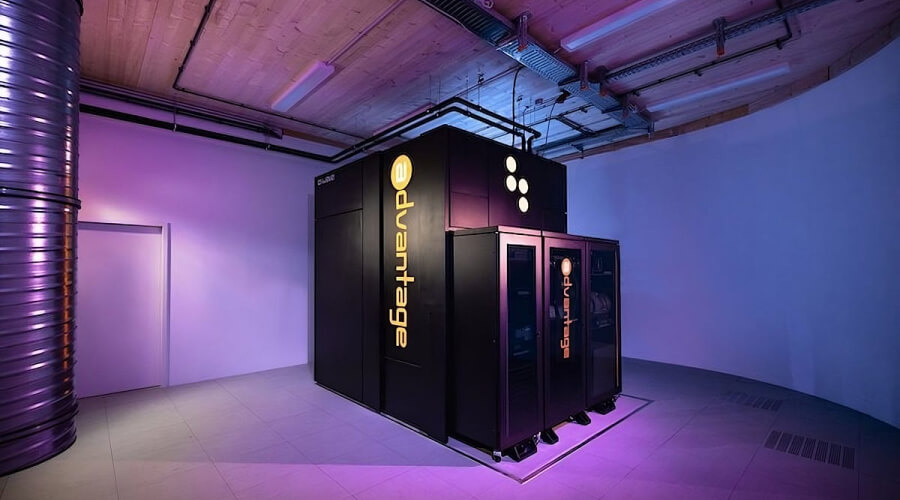
- Qubit Abundance: D-Wave Advantage, an outstanding quantum computer crafted by D-Wave, boasts an impressive assembly of 1,124 qubits, showcasing the company’s commitment to providing quantum annealing solutions for complex problems.
- Quantum Annealing Expertise: It is the most potent quantum annealing computer globally, with a quantum volume of 100 million. Quantum annealers excel in solving optimization problems, and D-Wave Advantage leverages this specialization.
- Optimization Prowess: The strength of D-Wave Advantage lies in its ability to address optimization challenges efficiently, offering real-world solutions in diverse fields, from logistics and finance to artificial intelligence and material science.
- D-Wave’s Leadership: D-Wave’s extensive experience in quantum annealing technology places D-Wave Advantage at the forefront of quantum computing for specific problem-solving tasks.
- Practical Impact: D-Wave Advantage represents a significant step in quantum annealing’s evolution, providing powerful computational capabilities for businesses and researchers seeking solutions to complex optimization challenges.
- Release: 2021
With its abundant qubits and quantum annealing specialization, D-Wave Advantage is a leader in addressing complex optimization problems. Its exceptional capabilities in this domain open doors to practical applications that can revolutionize industries reliant on efficient solutions to complex logistical and mathematical challenges.
7. IBM Eagle
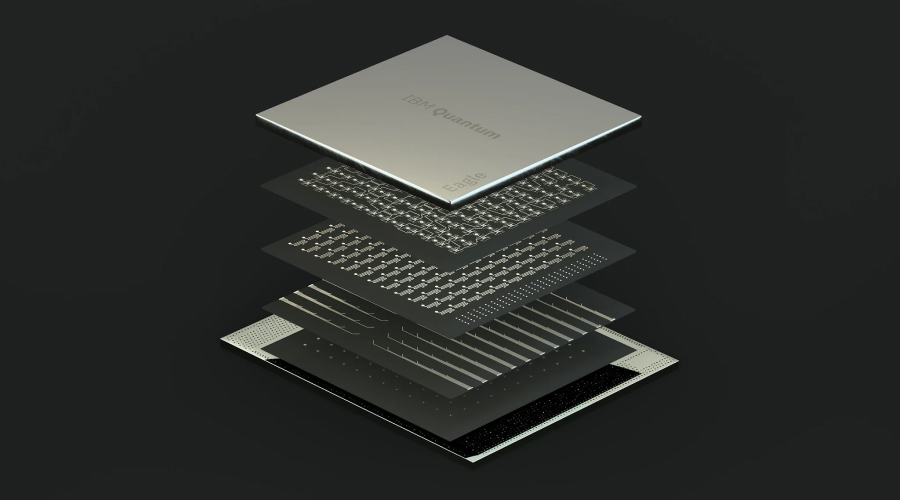
- Qubit Size: IBM Eagle, an upcoming quantum marvel from IBM, is set to debut with an impressive ensemble of 127 qubits, positioning it as a formidable contender in the quantum computing landscape.
- Anticipated Quantum Dominance: With a projected quantum volume of 100 million upon its release in 2023, IBM Eagle is expected to ascend as the most powerful quantum computer, underlining IBM’s commitment to advancing quantum technology.
- Trapped Ions for Unmatched Stability: IBM Eagle’s exceptional stability and precision are attributed to its utilization of trapped ions as qubits. This choice reflects IBM’s dedication to harnessing qubit technology that ensures reliability and accuracy.
- Research and Real-World Impact: IBM Eagle is poised to make a significant impact in quantum research and practical applications, offering solutions to complex problems across various domains, including optimization, cryptography, materials science, and more.
- Release date: 16th November 2021
With its substantial qubit count and emphasis on stability, IBM Eagle is expected to lead the quantum computing frontier, transforming how we approach complex computational challenges shortly. As it takes flight in 2024, it promises to unlock new possibilities in science and technology.
8. Alibaba Quantum Computer

- Qubit Size: The Alibaba Quantum Computer, a groundbreaking innovation from Alibaba, showcases a formidable assembly of 102 qubits, exemplifying the company’s dedication to advancing quantum computing technology.
- China’s Quantum Leader: Positioned as the most powerful quantum computer in China, Alibaba Quantum Computer is a testament to the nation’s ambitions in the quantum technology realm.
- Superconducting Qubit Technology: Like several other quantum powerhouses, Alibaba’s quantum machine relies on superconducting qubits. This choice underlines the importance of this technology in achieving stability and computational precision.
- Impressive Quantum Volume: With a substantial quantum volume of 200 million, Alibaba Quantum Computer stands out for its computational capabilities, making it an invaluable tool for various quantum applications.
- Versatile Potential: Beyond its raw power, this quantum computer has the potential to drive advances in various domains, from optimization problems and cryptography to drug discovery and materials science.
- Release date: July 2015
With its significant qubit count and reliance on superconducting qubits, Alibaba Quantum Computer embodies China’s commitment to quantum technology. It symbolizes the nation’s dedication to advancing the field and exploring new possibilities in science and industry.
9. Microsoft Azure Quantum
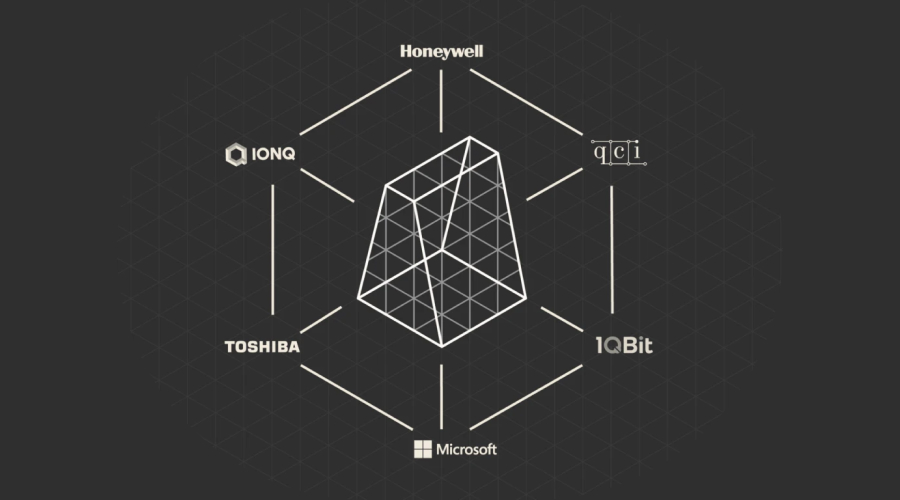
- Quantum Cloud Platform: Microsoft Azure Quantum is a pioneering cloud platform that offers users access to various quantum computers. It serves as a gateway to the quantum realm, enabling users to harness the power of quantum technology without the need for physical ownership.
- Impressive Quantum Resources: Azure Quantum boasts a collective offering of 100+ qubits, with a commendable quantum volume of 100 million across its quantum computers. This abundance of quantum resources makes it a significant player in the field.
- Microsoft’s Quantum Initiative: Developed by Microsoft, Azure Quantum reflects its commitment to quantum technology and its mission to democratize access to quantum computing capabilities.
- Convenience and Accessibility: The platform’s cloud-based approach provides a convenient and accessible means for individuals and organizations to initiate their journey into quantum computing, fostering a collaborative and exploratory environment.
- Versatility and Experimentation: Azure Quantum’s diverse quantum resources offer the opportunity to experiment, innovate, and tackle complex problems across various disciplines, from optimization and cryptography to materials science and more.
- Release date: 15th September 2023
Microsoft Azure Quantum, with its cloud-based quantum computing ecosystem, is a testament to Microsoft’s vision of making quantum technology accessible to a broader audience. It offers a convenient and versatile platform for individuals and organizations to explore the capabilities of quantum computing and its potential impact on diverse fields.
10. Google Sycamore
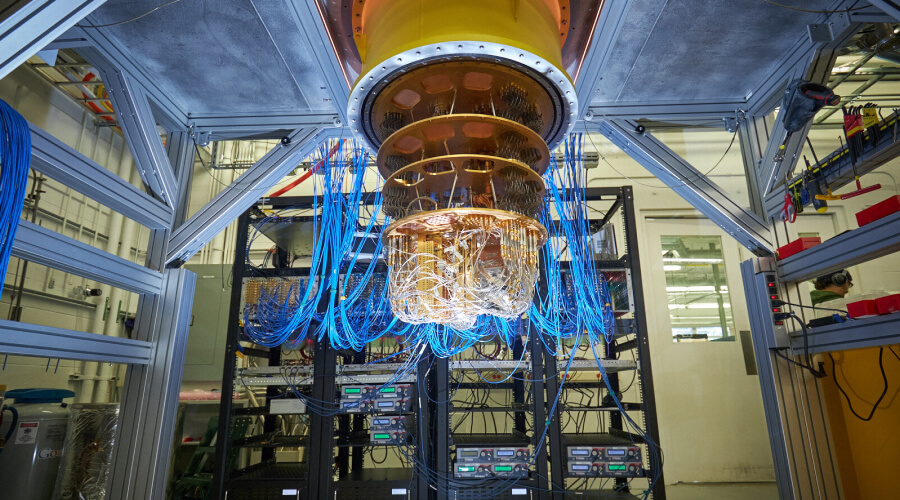
- Qubit Size: Google Sycamore, a groundbreaking quantum computer developed by Google, features a robust assembly of 54 qubits, exemplifying the company’s dedication to quantum computing technology.
- Quantum Supremacy Achievement: Google Sycamore made history by being the first quantum computer to achieve quantum supremacy. This means it solved a too-complex problem for classical computers, marking a significant milestone in quantum computing.
- Exceptional Quantum Volume: With a quantum volume of 128, Google Sycamore showcases remarkable computational capabilities, underscoring its potential to revolutionize problem-solving in various domains.
- Google’s Quantum Leadership: The development of Google Sycamore underscores Google’s commitment to pushing the boundaries of quantum technology and its vision to solve real-world problems that were previously impossible.
- Quantum Supremacy’s Impact: Google Sycamore’s achievement in quantum supremacy has far-reaching implications, opening the door to exploring new applications, from simulating quantum systems to optimizing complex logistical and mathematical challenges.
- Released: 2017
With its groundbreaking quantum supremacy achievement and remarkable computational capabilities, Google Sycamore is a trailblazer in the quantum computing landscape. Its success serves as an inspiration for quantum researchers and offers a glimpse into the transformative potential of this emerging technology.
Conclusion
In the quest to rank the ten best quantum computers in the world, we’ve witnessed this field’s remarkable diversity and innovation. These quantum machines, each with distinctive features and capabilities, represent the cutting edge of technology. From photonic quantum computers to those harnessing superconducting qubits, from quantum annealers designed for optimization tasks to cloud platforms making quantum accessible to all, the quantum landscape is rapidly evolving.
Pursuing quantum supremacy, stability, and unprecedented computational power drives advancements that promise to reshape industries, revolutionize problem-solving, and unlock new frontiers in science. As these quantum giants continue to push the boundaries, we can anticipate further groundbreaking achievements that will shape our future.






